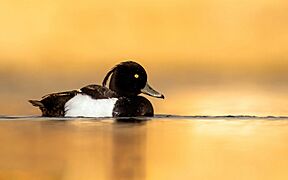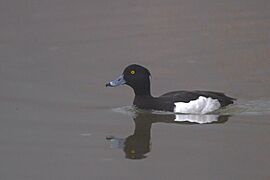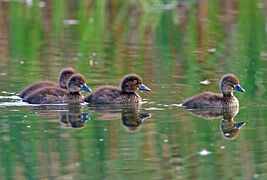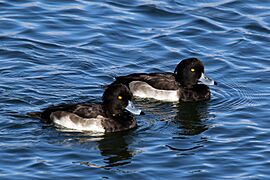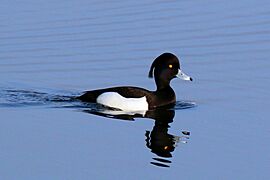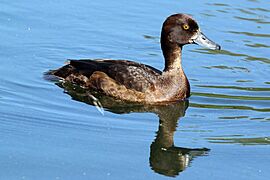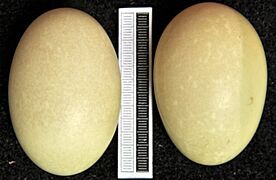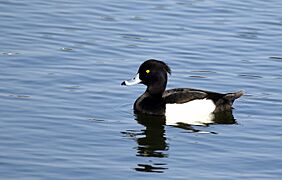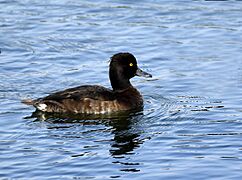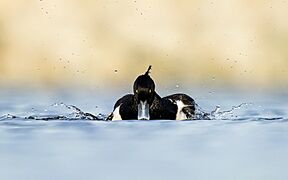Tufted duck facts for kids
Quick facts for kids Tufted duck |
|
|---|---|
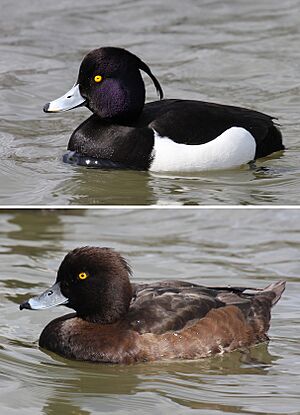 |
|
| Male (above) and female (below) | |
| Conservation status | |
| Scientific classification | |
| Genus: |
Aythya
|
| Species: |
fuligula
|
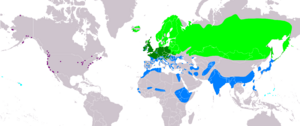 |
|
| Global distribution map Year-Round Range Summer Range Winter Range | |
| Synonyms | |
|
Anas fuligula Linnaeus, 1758 |
|
The tufted duck (also called the tufted pochard) (Aythya fuligula) is a small diving duck that lives in northern Europe and Asia. There are almost one million of these birds around the world. Its scientific name comes from old Greek and Latin words. These words describe it as a "sooty-colored seabird."
Contents
Meet the Tufted Duck
What Do Tufted Ducks Look Like?
Adult male tufted ducks are mostly black. They have bright white sides and a blue-grey bill. Their eyes are a cool gold-yellow color. The male also has a thin crest, or "tuft," of feathers at the back of its head. This tuft gives the duck its name!
Female tufted ducks are brown with lighter brown sides. They can be a bit harder to tell apart from other diving ducks. Some females have a white patch around their bill. This can make them look a little like scaup ducks. However, the white area is never as big as it is on scaup ducks.
How to Tell Them Apart
The female tufted duck makes a harsh, growling "karr" sound. She usually makes this sound when she is flying. Male tufted ducks are mostly quiet. But during courtship, they make simple "wit-oo" whistles.
The only ducks that look very similar are the greater scaup and lesser scaup. But these ducks do not have the special tuft of feathers. They also make different sounds.
Tufted Duck Measurements
Here are some facts about the size of tufted ducks:
| Measurement | Male | Female |
|---|---|---|
| Range of mass | 753-1026.2 g | 629-906.8 g |
| Average of mass | 889.6 g | 768.3 g |
| Range of length | 40.6-45.7 cm | 40.6-45.7 cm |
| Average of length | 43.2 cm | 43.2 cm |
| Range of wingspan | 20.2-21.2 cm | 19.4-20.7 cm |
Where Tufted Ducks Live
Global Distribution
Tufted ducks breed in the cooler, northern parts of Eurasia. This means they live across Europe and Asia. Sometimes, you might even see them visiting the coasts of the United States and Canada in winter.
It is thought that these ducks have spread to new areas. This happened because more open water became available. This open water came from places where gravel was dug up. Also, freshwater mussels, which are a favorite food, have spread.
Migration and Winter Homes
Most tufted ducks are migratory. This means they fly to different places depending on the season. They spend their winters in the warmer southern and western parts of Europe. They also go to southern Asia. In the British Isles, they stay all year round. One tufted duck was even seen as far away as Melbourne, Australia! In winter, these ducks gather in large groups on open water.
Tufted Duck Habitat
Tufted ducks like to build their nests near marshes and lakes. These places need to have lots of plants to hide their nests. You can also find them in coastal lagoons, along shorelines, and in calm ponds.
What Tufted Ducks Eat
These birds mainly find their food by diving underwater. But sometimes, they will tip their bodies upside down from the surface to grab food. They eat molluscs, which are like snails or clams. They also eat aquatic insects and some plants. Sometimes, they even feed at night!
Tufted Ducks and People
In some countries, like the UK, Italy, Iran, Finland, and Denmark, tufted ducks are hunted for sport. In Iran, they are also hunted for business. In Iceland, people used to gather their eggs.
Gallery
-
Male at Nagdaha, Nepal
-
Immature males, Farmoor Reservoir, Oxfordshire
-
Male, Farmoor Reservoir, Oxfordshire
-
Female, WWT London Wetland Centre
-
A tufted duck swimming in Nagadaha lake, Lalitpur, Nepal
-
Flock of 2000 tufted ducks in Ystad port, 16 January 2016




